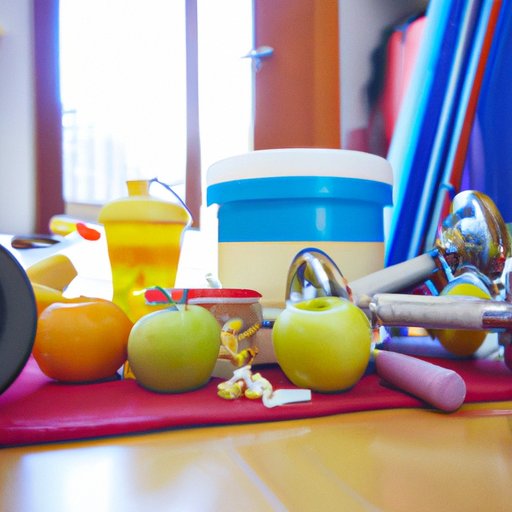
I. Introduction
Are you struggling to gain weight and build muscle despite consistent effort in the gym? Look no further, as this article will provide you with a comprehensive guide on how to achieve your fitness goals. We will cover essential topics such as nutrition, weightlifting, recovery, supplement, and goal setting.
II. 10 Foods to Help Build Muscle and Gain Weight
Nutrition is a critical factor in building muscle and gaining weight. Incorporating protein and healthy fats to your diet is essential for muscle growth. Protein helps to repair and build muscle tissue; healthy fats allow your body to store energy and provide necessary nutrients. Here are ten foods to help you with your muscle-building goals:
- Salmon
- Eggs
- Quinoa
- Lean Beef
- Cottage Cheese
- Almonds
- Greek Yogurt
- Chicken Breast
- Peanut Butter
- Sweet Potato
These foods are high in protein, healthy fats, and other nutrients that your body needs for efficient muscle growth. Incorporate these into your diet, and you’ll see the results.
III. The Ultimate Guide to Weightlifting for Muscle Gain
Weightlifting is the primary way to build and gain muscles. Lifting weights puts resistance on muscles, breaking down fibers and forcing your body to repair them stronger and larger. Here’s a guide on how to maximize your weightlifting routine:
Proper Form and Technique
Correct form and technique are essential when performing weightlifting exercises. Proper posture and movement patterns reduce your risk of injury and ensure that you’re targeting the intended muscle group. If you are new to weightlifting, beware of the risks of doing exercises incorrectly or with heavy weights. Don’t be afraid to ask for assistance from a fitness professional.
Workout Regimen
The frequency and intensity of your workouts determine how fast you gain muscles. Beginners can start with two to three days a week of full-body workout that targets major muscle groups. Advanced lifters can switch to different split routines, each day focusing on a specific muscle group or body part.
IV. Maximizing Muscle Growth: The Importance of Rest and Recovery
Rest and recovery are as crucial to muscle growth as weightlifting. When you rest, your muscle fibers repair the microtears created by weightlifting, which makes them grow stronger and larger. Here are ways to maximize your rest and recovery:
Active Recovery
Active recovery includes low-intensity movements, such as walking or stretching, that can help increase blood flow and reduce post-workout soreness.
Sleep
Sleep is another way your body repairs itself. The recommended amount of sleep is 7-9 hours every night. Lack of sleep can impair muscle growth and hormonal balance.
Nutrition
Proper nutrition is also critical to recovery. After a workout, your body needs proteins, carbohydrates, and other micronutrients to repair the muscle fibers. Eating a balanced meal that contains protein, carbohydrates, and natural sugar will help.
V. The Role of Supplements in Muscle Gain and Weight Gain
Supplements are intended to supplement an already healthy diet and are not a substitute for it. Consulting with your healthcare professional before taking supplements is essential. Here’s what you need to know about supplements:
Types of Supplements Available
There are various supplements available in the market that claim to help with muscle growth. The most common and proven effective are protein, creatine, and branched-chain amino acids.
Pros and Cons of Taking Supplements
Supplements can enhance muscle growth, but they can also have side effects. Excessive intake of protein supplements can damage the kidneys, and taking any type of supplement can cause gastrointestinal discomfort. Moderation and professional advice are essential when taking supplements.
VI. Setting Realistic Goals for Muscle and Weight Gain
Setting realistic goals is crucial to achieving any fitness objective. Here are some tips on how to achieve it:
Track Progress
Keeping track of your weight, muscle mass, and body fat percentage is an excellent way to monitor your progress and determine if your routine needs adjustment.
Develop a Sustainable Regimen
Develop a routine that fits your lifestyle and allows you to meet your goals. A routine that is too intense or inconvenient will lead to burnout.
VII. Conclusion
In conclusion, gaining weight and building muscle are not impossible. It requires a combination of the right nutrition, regular weightlifting, rest and recovery, supplements, and goal settings. Remember, progress takes time and effort. Be patient and consistent, and you’ll see the results you’re looking for.




